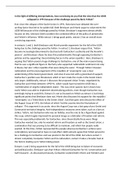In the light of differing interpretations, how convincing do you find the view that the USSR
collapsed in 1991 because of the challenge posed by Boris Yeltsin?
Ever since the collapse of the Soviet Union in 1991, historians have debated the over-
arching factor that led to its sudden fall. Both Breslauer and Marsh argue to what extent the
USSR fell because of the challenge posed by Yeltsin. Breslauer’s argument almost wholly
focuses on this, whereas Smith considers the combined effect of the policy of perestroika
and Yeltsin’s influence. While extract 1 brings good points, extract 2 has an overall more
convincing argument.
In extracts 1 and 2, both Breslauer and Marsh provide arguments for the fall of the USSR
being due to the challenge posed by Yeltsin. In extract 1, Breslauer argues that, ‘Yeltsin
became increasingly determined to destroy both Gorbachev’s authority and the Kremlin’s
powers’, and Breslauer shows he does this predominantly through opposing Gorbachev’s
policies and by supporting ‘decentralising forces in the union republics’. Here, Breslauer is
arguing that Yeltsin posed a huge challenge to Gorbachev, one of the main reasons being
that he was a significant figure in the Party who supported nationalistic sentiment not only
in Russia, but also ‘other republics that were doing the same’. Through Yeltsin’s Russian
nationalism and his encouragement of the republics of ‘sovereignty’ was a clear
undermining of the Soviet government, and since it was met with a great deal of support,
Gorbachev’s position was threatened, which in turn made the cracks in the Soviet Union
only larger. Additionally, extract 1 discusses the proposed Union Treaty, negotiated by
Gorbachev and Yeltsin between 1990-91, which would have turned the USSR into a
‘confederation of largely independent states’. This was never passed, but it shows how
easily Yeltsin was able to implement decentralising policies, even though Gorbachev was
seemingly trying to avoid this. Extract 2 is not as focused on Yeltsin as extract 1, but brings
significant points that Breslauer does not. Marsh also discusses his support for the republics’
‘sovereignty’ as a ‘lethal blow to the Soviet Union’, but then goes onto discuss the effect of
the August Coup of 1991, the failure of which ‘led the country into the final phase of
collapse’. This argument is accurate, since the August Coup was a last gasp of pro-Soviet and
Communist territorial integrity. Anti-independence measures were taken, such as a ban on
strikes. Yeltsin, not Gorbachev who was on holiday, was the one to be a figurehead against
this coup, which hugely improved his personal image as a defender of freedom and reform.
This was especially problematic for Gorbachev, since theoretically these were things
Gorbachev wanted too, only he wanted reform and freedom as well as the Soviet Union, a
combination that was proving to be difficult to maintain, and which few people really
wanted. At this time, Yeltsin represented the people whereas Gorbachev’s actions were
contradictory and seemed to have no real effect. Both extracts agree that Yeltsin proved to
be a challenge to Gorbachev and was pivotal in the fall of the USSR, but where extract 1
almost completely inculpates Yeltsin and his nationalism, extract 2 takes a broader look at
the factors leading up to Yeltsin taking power.
Extracts 1 and 2 bring arguments for the fall of the USSR being due to failure of economic
and political policy. Breslauer says that Yeltsin criticised Gorbachev for his ‘conservatism and
half-measures’. As discussed previously, Gorbachev wanted both reform and freedom and




